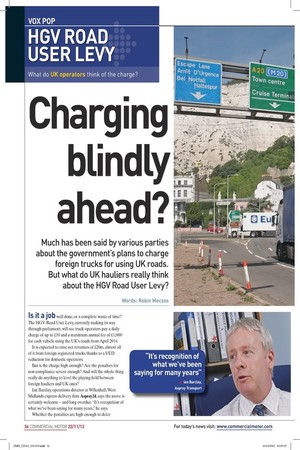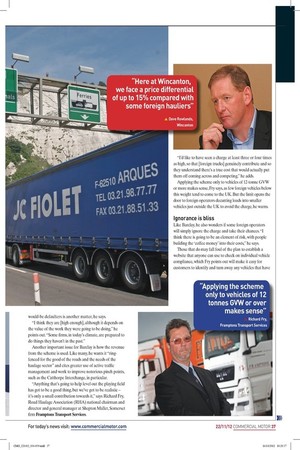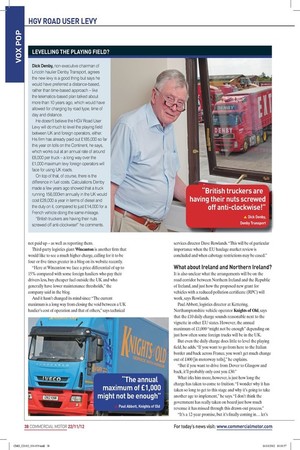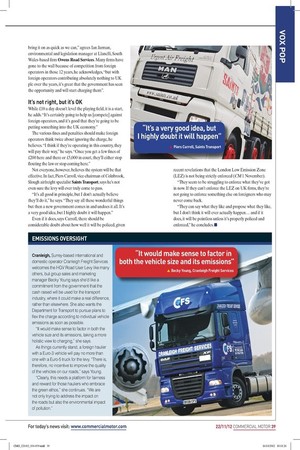Charging blindly ahead?
Page 27

Page 28

Page 29

Page 30

If you've noticed an error in this article please click here to report it so we can fix it.
Much has been said by various parties about the government’s plans to charge foreign trucks for using UK roads. But what do UK hauliers really think about the HGV Road User Levy?
Words: Robin Meczes Is it a job well done, or a complete waste of time? The HGV Road User Levy, currently making its way through parliament, will see truck operators pay a daily charge of up to £10 and a maximum annual fee of £1,000 for each vehicle using the UK’s roads from April 2014.
It is expected to raise net revenues of £20m, almost all of it from foreign-registered trucks thanks to a VED reduction for domestic operators.
But is the charge high enough? Are the penalties for non-compliance severe enough? And will the whole thing really do anything to level the playing field between foreign hauliers and UK ones?
Ian Barclay, operations director at Willenhall, West Midlands express delivery firm Aspray24, says the move is certainly welcome – and long overdue. “It’s recognition of what we’ve been saying for many years,” he says.
Whether the penalties are high enough to deter would-be defaulters is another matter, he says.
“I think they are [high enough], although it depends on the value of the work they were going to be doing,” he points out. “Some firms, in today’s climate, are prepared to do things they haven’t in the past.” Another important issue for Barclay is how the revenue from the scheme is used. Like many, he wants it “ringfenced for the good of the roads and the needs of the haulage sector” and cites greater use of active traffic management and work to improve notorious pinch points, such as the Catthorpe Interchange, in particular.
“Anything that’s going to help level out the playing field has got to be a good thing, but we’ve got to be realistic – it’s only a small contribution towards it,” says Richard Fry, Road Haulage Association (RHA) national chairman and director and general manager at Shepton Mallet, Somerset firm Framptons Transport Services. “I’d like to have seen a charge at least three or four times as high, so that [foreign trucks] genuinely contribute and so they understand there’s a true cost that would actually put them off coming across and competing,” he adds.
Applying the scheme only to vehicles of 12-tonne GVW or more makes sense, Fry says, as few foreign vehicles below this weight tend to come to the UK. But the limit opens the door to foreign operators decanting loads into smaller vehicles just outside the UK to avoid the charge, he warns.
Ignorance is bliss
Like Barclay, he also wonders if some foreign operators will simply ignore the charge and take their chances. “I think there is going to be an element of risk, with people building the ‘coffee money’ into their costs,” he says.
Those that do may fall foul of the plan to establish a website that anyone can use to check on individual vehicle compliance, which Fry points out will make it easy for customers to identify and turn away any vehicles that have not paid up – as well as reporting them.
Third-party logistics giant Wincanton is another firm that would like to see a much higher charge, calling for it to be four or five times greater in a blog on its website recently.
“Here at Wincanton we face a price differential of up to 15% compared with some foreign hauliers who pay their drivers less, buy cheaper fuel outside the UK and who generally have lower maintenance thresholds,” the company said in the blog.
And it hasn’t changed its mind since: “The current maximum is a long way from closing the void between a UK haulier’s cost of operation and that of others,” says technical services director Dave Rowlands. “This will be of particular importance when the EU haulage market review is concluded and when cabotage restrictions may be eased.”
What about Ireland and Northern Ireland?
It is also unclear what the arrangements will be on the road corridor between Northern Ireland and the Republic of Ireland, and just how the proposed new grant for vehicles with a reduced pollution certificate (RPC) will work, says Rowlands.
Paul Abbott, logistics director at Kettering, Northamptonshire vehicle operator Knights of Old, says that the £10 daily charge sounds reasonable next to the vignette in other EU states. However, the annual maximum of £1,000 “might not be enough” depending on just how often some foreign trucks will be in the UK.
But even the daily charge does little to level the playing field, he adds. “If you want to go from here to the Italian border and back across France, you won’t get much change out of £400 [in motorway tolls],” he explains.
“But if you want to drive from Dover to Glasgow and back, it’ll probably only cost you £30.” What irks him more, however, is just how long the charge has taken to come to fruition. “I wonder why it has taken so long to get to this stage and why it’s going to take another age to implement,” he says. “I don’t think the government has really taken on board just how much revenue it has missed through this drawn-out process.” “It’s a 12-year promise, but it’s finally coming in... let’s bring it on as quick as we can,” agrees Ian Jarman, environmental and legislation manager at Llanelli, South Wales-based firm Owens Road Services. Many firms have gone to the wall because of competition from foreign operators in those 12 years, he acknowledges, “but with foreign operators contributing absolutely nothing to UK plc over the years, it’s great that the government has seen the opportunity and will start charging them” .
It’s not right, but it’s OK
While £10 a day doesn’t level the playing field, it is a start, he adds. “It’s certainly going to help us [compete] against foreign operators, and it’s good that they’re going to be putting something into the UK economy.” The various fines and penalties should make foreign operators think twice about ignoring the charge, he believes. “I think if they’re operating in this country, they will pay their way,” he says. “Once you get a few fines of £200 here and there or £5,000 in court, they’ll either stop flouting the law or stop coming here.” Not everyone, however, believes the system will be that effective. In fact, Piers Carroll, vice-chairman of Colnbrook, Slough airfreight specialist Saints Transport, says he’s not even sure the levy will ever truly come to pass.
“It’s all good in principle, but I don’t actually believe they’ll do it,” he says. “They say all these wonderful things but then a new government comes in and undoes it all. It’s a very good idea, but I highly doubt it will happen.” Even if it does, says Carroll, there should be considerable doubt about how well it will be policed, given recent revelations that the London Low Emission Zone (LEZ) is not being strictly enforced (CM 1 November).
“They seem to be struggling to enforce what they’ve got in now. If they can’t enforce the LEZ on UK firms, they’re not going to enforce something else on foreigners who may never come back.
“They can say what they like and propose what they like, but I don’t think it will ever actually happen... and if it does, it will be pointless unless it’s properly policed and enforced,” he concludes. ■
LEVELLING THE PLAYING FIELD?
Dick Denby, non-executive chairman of Lincoln haulier Denby Transport, agrees the new levy is a good thing but says he would have preferred a distance-based, rather than time-based approach – like the telematics-based plan talked about more than 10 years ago, which would have allowed for charging by road type, time of day and distance.
He doesn’t believe the HGV Road User Levy will do much to level the playing field between UK and foreign operators, either. His firm has already paid out £185,000 so far this year on tolls on the Continent, he says, which works out at an annual rate of around £8,000 per truck – a long way over the £1,000 maximum levy foreign operators will face for using UK roads.
On top of that, of course, there is the difference in fuel costs. Calculations Denby made a few years ago showed that a truck running 156,000km annually in the UK would cost £28,000 a year in terms of diesel and the duty on it, compared to just £14,000 for a French vehicle doing the same mileage.
“British truckers are having their nuts screwed off anti-clockwise!” he comments.
EMISSIONS OVERSIGHT
Cranleigh, Surrey-based international and domestic operator Cranleigh Freight Services welcomes the HGV Road User Levy like many others, but group sales and marketing manager Becky Young says she’d like a commitment from the government that the cash raised will be used for the transport industry, where it could make a real difference, rather than elsewhere. She also wants the Department for Transport to pursue plans to flex the charge according to individual vehicle emissions as soon as possible.
“It would make sense to factor in both the vehicle size and its emissions, taking a more holistic view to charging,” she says.
As things currently stand, a foreign haulier with a Euro-3 vehicle will pay no more than one with a Euro-5 truck for the levy. “There is, therefore, no incentive to improve the quality of the vehicles on our roads,” says Young.
“Clearly, this needs a platform for fairness and reward for those hauliers who embrace the green ethos,” she continues. “We are not only trying to address the impact on the roads but also the environmental impact of pollution.”










































